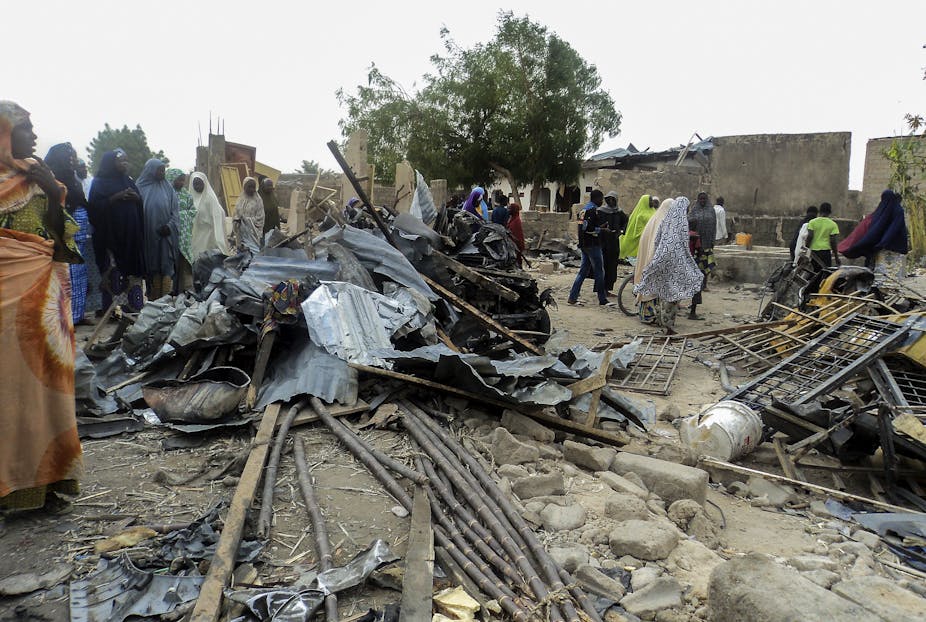As Nigeria’s rescheduled election approaches, the international community, especially Europe and America, have insisted that the will of the people should and must be heard – since the “security concerns” that shifted the elections have apparently been substantially addressed.
But many commentators take a different view, and see critical challenges in Nigeria’s immediate future, regardless of whether Goodluck Jonathan survives or loses. And there is scarcely a more terrifying challenge on the horizon than the lethal six-year insurgency fought by Boko Haram.
Rotten record
Ever since coming to prominence in 2002, the Jama’atu Ahl us-Sunnah Li’da’awati Wal Jihad (The Group of the People of Sunnah for Preaching and Struggle) saga, popularly referred to as Boko Haram (loosely, “Western Education is Forbidden”, has made a mockery of all Nigeria’s state institutions, and its military above all.
Claiming to be the Firqat un-Naji’ah (the “Saved” sect), Boko Haram seeks to create a “pure” Islamic state, in which it implements a brand of Sharia law under which Muslims, Christians and atheists who oppose their doctrine must face death.
Nigeria’s relatively poor governance has provided a febrile atmosphere for the group. With widespread corruption, poverty, security force abuses and impunity, there has been little to stop Boko Haram’s troops from repeatedly attacking strategic targets, destroying lives and property and slaughtering almost everyone in their path.
Since a state of emergency was imposed in three states in North Eastern Nigeria (Borno, Yobe and Adamawa) in 2012, the Nigerian state charged with the responsibility of securing and protecting lives and property seems incapable of the great task of providing a safe and protected environment for its citizens.
BringBackOurGirls
On April 14 2014, 276 girls were kidnapped from the Girls Secondary School in Chibok, setting off a roller coaster of inconsistencies and walk-backs that in the end have come to nothing.
The response to the kidnapping was greatly complicated not just by the fear instilled by the sect, but also by the response of the Nigerian government and its sympathisers. The messages coming out of Abuja about the girls’ fate have been conflicted and confusing to say the least.

In place of decisive and effective action to find the girls, questions have been raised about the real motive behind the attacks and the actual number of girls kidnapped. At one point, the director of Defence Information announced the rescue of 129 girls – but then retracted his statement the next day.
57 of the 276 girls escaped, The Nigerian military’s inability to locate and rescue the remaining 219 girls led to local and international outrage, even as the #BBOG movement seeking the girls’ release spread around the world. By the end of 2014, the response had descended into depressing apathy – and the schoolgirls have hardly featured in the 2015 presidential campaign.
Chaos reigns
The same confusion and impotence that hobbled the search for the girls has marked the whole of Nigeria’s response to Boko Haram’s unpredictable and murderous advance.
A ceasefire deal, announced on October 17 2014, which was brokered by the Nigerian state through the Chadian government, was denied by Abubakar Shekau, the acclaimed leader of the sect, further debunking statements by the Nigerian state, as well as the bogus identities of the Boko Haram negotiators.
Since being dislodged from Maiduguri and relocating to the Sambisa forest in southern Borno State after a joint offensive of the Nigerian military and the civilian vigilante militia (CJTF), Boko Haram has hardly backed down.

It declared a caliphate with headquarters at Gwoza in August 2014, which was again put under its draconian flavour of Sharia. The January 3 2015 assault on the border town of Baga on Lake Chad and the camp of the Multi-National Joint Task Force (MNJTF) was possibly the deadliest massacre the group has ever perpetrated. It also exposed the cripplingly low morale and professionalism that hobbles the Nigerian military.
With tensions rising as a result of the presidential elections scheduled for February 2015 – and facing a credible threat from a strong and viable opposition, the Nigerian government orchestrated a six-week postponement of the polls till March 28, citing some bogus security reasons.
Suddenly, what seemed impossible to achieve in six years was being promised in six weeks. With the approval of the African Union, a multinational response spearheaded by Cameroon, Chad and Niger, with Nigeria in tow, which has led to Boko Haram fighters fleeing from several locations in the north-eastern part of Nigeria, is still plagued by operational inconsistencies from the Nigerian side as a result of six years of inaction.
All in all, the progress of the anti-Boko Haram coalition has been marred by cross-border attacks and competing claims and denials about new kidnappings – so much so that it is very difficult to know where the battle against Boko Haram stands.
Meanwhile, the chaos of the whole Boko Haram affair has done nothing to ease the mood of Nigerian society. People are sceptical, doubtful, disappointed and angry with the poor show of political will and outright incompetence with which the authorities have met the six-year insurgency.
The road map to counter the Boko Haram insurgency may be finally working by some measures, but the integrity of the nation is at stake. Whoever wins the election has a daunting task ahead: to cast aside the political and ethnic constraints that have weakened the legitimacy of the state and the military for too long.
The bodies lying in Boko Haram’s wake are the measure of that failure.

